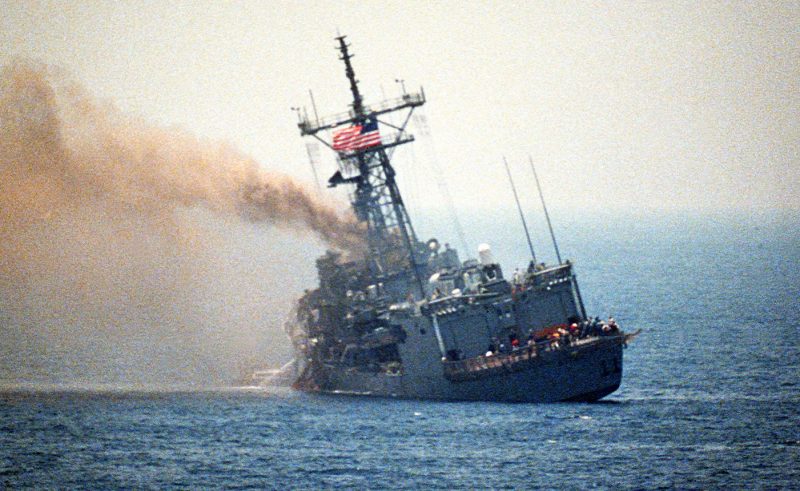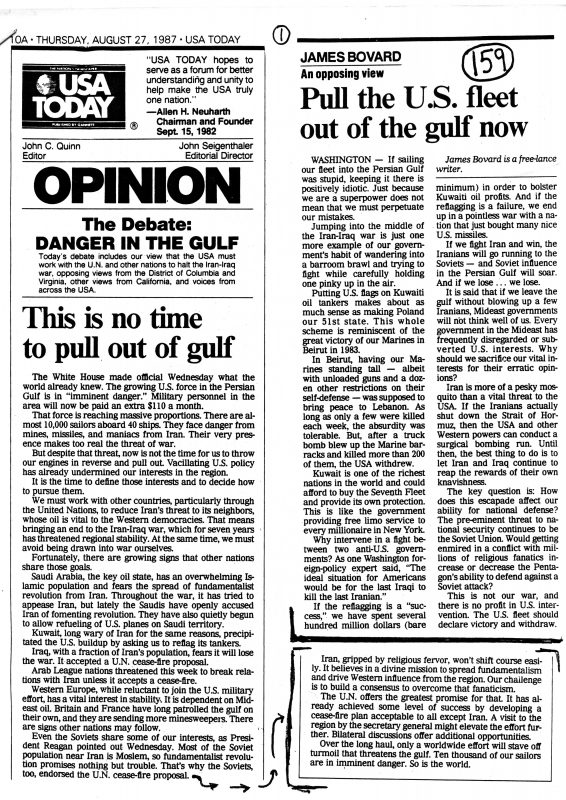 U.S. government policy in the Middle East has been consistently idiotic for more than a third of a century. Here’s the first article I wrote calling for U.S. military withdrawal from that area – an “opposing view” to a USA Today editorial board position. Some Reagan administration officials had the bright idea of placing U.S. flags on Kuwaiti oil tankers. Even back then, plenty of Washington operatives for clamoring to create a pretext for attacking Iran. The following year, a U.S. Navy missile frigate shot down an Iranian passenger jet, killing almost 300 civilians. **************
U.S. government policy in the Middle East has been consistently idiotic for more than a third of a century. Here’s the first article I wrote calling for U.S. military withdrawal from that area – an “opposing view” to a USA Today editorial board position. Some Reagan administration officials had the bright idea of placing U.S. flags on Kuwaiti oil tankers. Even back then, plenty of Washington operatives for clamoring to create a pretext for attacking Iran. The following year, a U.S. Navy missile frigate shot down an Iranian passenger jet, killing almost 300 civilians. **************
USA Today, August 27, 1987
Pull the U.S. Fleet Out of the Gulf Now
by James Bovard
If sailing our fleet into the Persian Gulf was stupid, keeping them there is positively idiotic. Just because we are a superpower does not mean that we must perpetuate our mistakes.
Jumping into the middle of the Iran-Iraqi war is just one more example of our government’s habit of wandering into a barroom brawl and trying to fight while carefully holding one pinky up in the air.
Putting U.S. flags on Kuwaiti oil tankers makes about as much sense as making Poland our 5lst state. This whole scheme is reminiscent of the great victory of our Marines in Beirut in l983. In Beirut, having our Marines standing tall – albeit with unloaded guns and a dozen other restrictions on their self-defense – was supposed to bring peace to Lebanon. As long as only a few Marines were killed each week, the absurdity was tolerable. But, after a truck bomb blew up the Marine barracks and killed over 200 Americans, the U.S. withdrew.
Kuwait is one of the richest nation in the world, and could afford to almost buy the the U.S. Seventh Fleet and provide its own protection. This is like the government providing free limo service to all the millionaires in New York City.
Why intervene in a fight between two anti-American governments? As one Washington foreign policy expert said, “The ideal situation for Americans would be for the last Iraqi to kill the last Iranian.” [cringe 2020]
If the re-flagging is a “success,” we have spent several hundred millions dollars (bare minimum) in order to bolster Kuwaiti oil profits. And if the re-flagging is a failure, we end up in a pointless war with a nation that just bought many nice American missiles.
If we fight Iran and win, the Iranians will go running to the Soviets – and Soviet influence in the Persian gulf will soar. And if we lose…. we lose.
It is said that if we leave the Gulf without blowing up a few Iranians, Mideast governments will not think well of us. Every government in the Mideast has frequently disregarded or subverted U.S. interests. Why should we sacrifice our vital interests for their erratic opinions?
Iran is more of a pesky mosquito than a vital threat to the U.S. If the Iranians actually shut down the Strait of Hormuz, then the U.S. and other western powers can conduct a surgical bombing run. Until then, the best thing to do is to let Iran and Iraq continue to reap the rewards of their own knavishness.
The key question is: how does this escapade affect our ability for national defense? The preeminent threat to national security continues to be the Soviet Union. Would getting enmired in a conflict with millions of religious fanatics increase or decrease the Pentagon’s ability to defend against a Russian attack?
This is not our war, and there is no profit in U.S. intervention. The U.S. fleet should declare victory and withdraw.++++
***************
I wrote about this topic for the Detroit News the prior month; my style was more playful in that column.
Detroit News, July 9(?), 1987
More American Ducks in the Gulf?
by James Bovard
Sentimentality now appears to be the soul of Reagan’s foreign policy. From charging into the Persian Gulf to wave the American flag, to sending cakes and Bibles and missiles to the Ayatollah’s regime, to rushing to negotiate an Arms control treaty with Soviets, our foreign policy is degenerating into a series of half-witted public relations schemes.
The plan to put U.S. flags on Kuwaiti oil tankers makes about as much sense as making Poland our 51st state. The U.S. flagging of Kuwaiti ships is reminiscent of putting U.S. Marines in Beirut – the same lack of clear goal, same lack of foresight, and same lack of strategy.
In Beirut, having our Marines standing tall – albeit with unloaded guns and a dozen other restrictions on their self-defense – was supposed to bring peace to Lebanon. As long as only a few Marines were killed each week, the absurdity was tolerable. But, after a truck bomb blew up the Marine barracks and killed over 200 Americans, the U.S. withdrew.
Freedom of the seas is a valuable principle but it is a doubtful cause in the Gulf. We will be intervening to protect Kuwaiti ships while Iraq continues its attacks on Iranian ships. Iraqi’s foreign minister, speaking on American TV on last week, implied that Iraq had no intention of stopping its bombing on Iranian shipping in the gulf.
Jumping into the middle of the Iran-Iraqi war is just one more example of our government’s habit of wandering into a barroom brawl and trying to fight while carefully holding one pinky up in the air.
Why take sides in a fight between two knaves? Iraq may be the lesser of two evils. But what difference does it make if one country’s leaders are destined for the seventh circle of hell, and the other’s are destined for the sixth circle of hell?
Kuwait is one of the richest nations in the world and could afford to almost buy the the U.S. Seventh Fleet and provide its own protection. This is like the government providing free limo service to all the millionaires in New York City.
The Reagan Administration claims that since the Soviets are providing flag coverage for three Kuwait tankers, the U.S. is obliged to do the same. The Soviets are massacring millions of Afghans. Does that mean we should cross the Rio Grande and knock off a few million Mexicans? Re-flagging Kuwaiti ships is based on the idea that we must match the Soviets point for point, move for move, in every arena in the world. But, this is both foolish and masochistic.
The key factor now in the Cold War – one little recognized by most commentators dazzled by Gorbachev’s speeches – is that the Soviet economy is slowly sinking. The Soviet Union is increasingly an “Upper Volta with missiles”, as the Economist termed it. The technological gap between East and West is widening by the month. No amount of minor tinkering will succeed in overhauling an incredibly-badly built socialist engine. Soviet economic reforms are based on Hungarian so-called mixed economy – a miserable hodgepodge of measures that means deteriorating living standards in Budapest and soaring foreign debt for Hungary.
Time is on our side – as long as we don’t do something stupid like getting into a war with a bunch of wackos with Exocet missiles and F-15 jets. At the moment, Iran is more a pesky mosquito than a vital threat to our national interest. If Iran actually tries to close the Persian Gulf, then the U.S. and other western powers can conduct a surgical bombing run.
Our national interest requires more than mindless bellicosity in the Mideast and mindless pacifism against the Soviets. If the best foreign policy is to run up the flag, let people shoot a few holes in it, proclaim victory and withdraw, re-flagging Kuwaiti flags is brilliant. At least for now, it is best to let Lloyd’s of London cover the risks of Persian Gulf shipping.
+++++
And a big hat tip here to my late Dad, who was vastly better organized than I was at keeping track of my publications.



[…] in USA Today: […]